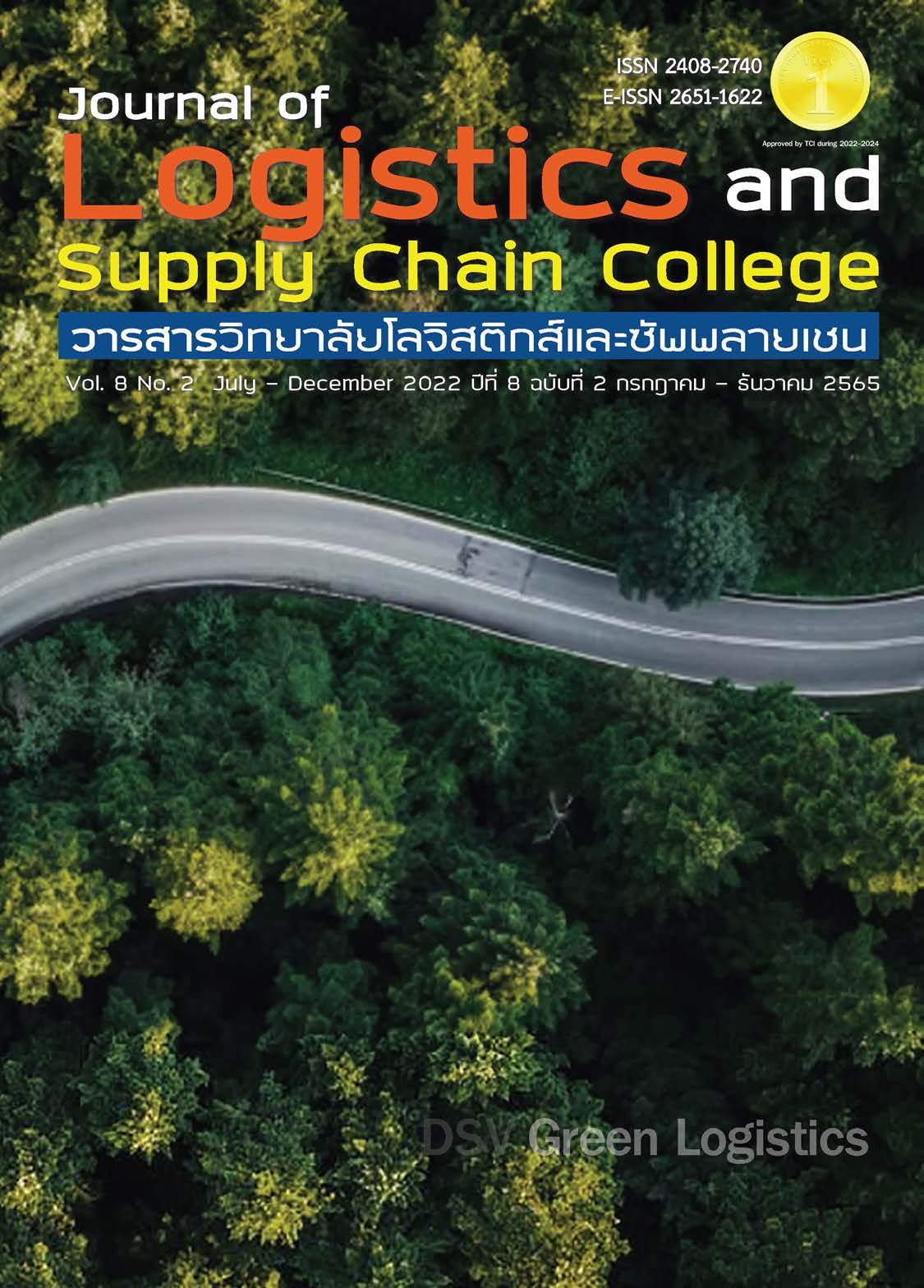Logistics Performance Affecting Logistics Service Provider Selection of Processed Seafood Manufacturers in Thailand
Keywords:
Logistics Performance, Logistics Service Provider, Processed Seafood ManufacturersAbstract
The purpose of this research aims to study the levels of logistics performance, logistics service provider selection of processed seafood producers in Thailand and to analyze the effect of logistics performance on the logistics service provider selection of processed seafood manufacturers in Thailand. The study was quantitative research. The data were collected from a sample of 126 processed seafood producers from a population of 144 domestic seafood producers in the database of the Department of Industrial Works. The research tool was a questionnaire, and its reliability was tested by Cronbach's alpha coefficient. The data was analyzed by using mean, frequency, standard deviation, and multiple regression statistics. The results found that the overall opinion on each factor affecting the logistics service provider selection of Processed Seafood Producers in Thailand was high. In addition, cost, time and reliability factors affected the selection of logistics service providers for processed seafood producers in Thailand. Moreover, the findings suggest that Logistics service providers should focus on enhancing service reliability because it is the most critical factor for seafood manufacturers when choosing logistics providers.
References
กาญจน์สิตา โฆษิตธัญญสิทธิ์ และชนงกรณ์ กุณฑลบุตร. (2556). ปัจจัยที่มีอิทธิพลต่อการเลือกผู้ให้บริการโลจิสติกส์ในกลุ่มอุตสาหกรรมการผลิตอาหารและเครื่องดื่ม. RMUTT Global Business and Economics Review, 11(1), 139-157.
ดนัย ปัตตพงศ์. (2559). เอกสารวิชาการด้านการวิจัยและสถิติประยุกต์. สืบค้นจากhttp://it.nation.ac.th
ทวีศักดิ์ เทพพิทักษ์. การจัดการโลจิสติกส์และซัพพลายเชน. กรุงเทพมหานคร: สำนักพิมพ์เอ็กซเปอร์เน็ท, 2550.
ธราภรณ์ เสือสุริย์. (2558). ปัจจัยที่อิทธิพลของคุณภาพการให้บริการ ที่มีต่อความไว้วางใจ ความพึงพอใจ การบอกต่อและ การกลับมาใช้บริการซ้ำของลูกค้าโรงแรมระดับห้าดาว. การศึกษาเฉพาะบุคคลปริญญามหาบัณฑิต, มหาวิทยาลัยกรุงเทพ.
พิมพ์เพ็ญ พรเฉลิมพงศ์ และนิธิยา รัตนาปนนท์. (2557). ความหมายและความสำคัญอุตสาหกรรมอาหาร. จาก: http://www.foodnetworksolution.com/wiki/word/2561/อุตสาหกรรมอาหาร.
วันพิชิตต์ อรรคดีและศักดิ์สินี กลิ่นสุนทร. (2560). ปัจจัยที่สำคัญต่อการเลือกใช้บริการขนส่งของบริษัทยูเซ็นโลจิสติกส์(ประเทศไทย) จำกัด. การประชุมทางวิชาการระดับชาติและนานาชาติ. กรุงเทพมหานคร
วิมลวัลย์ ทรงศิริยศ. (2559). ปัจจัยที่ส่งผลต่อการตัดสินใจเลือกใช้บริการขนส่งสินค้าขาออกของผู้ประกอบการ กรณีศึกษาท่าเรือกรุงเทพ. วารสารมหาวิทยาลัยนครราชสีมา, 10(2), 15-22.
สิริรักษ์ ภู่ริยะพันธ์ และคณะ. (2554). การศึกษาถึงปัจจัยที่มีผลต่อการเลือกใช้บริการการจัดจ้างด้านการขนส่งสินค้า. วารสารบริหารธุรกิจเทคโนโลยีมหานคร, 8(1), 1-8.
สุนทรี เจริญสุข. (2555). การจัดการโลจิสติกส์เพื่อสร้างความได้เปรียบทางการแข่งขัน: กรณีศึกษาบริษัทวี-เซิร์ฟโลจิสติกส์ จ้ากัด. วารสารวิชาการ มหาวิทยาลัยหัวเฉียวเฉลิมพระเกียรติ ,119(15), 119-138.
สภาอุตสาหกรรมแห่งประเทศไทย. (2563). ศักยภาพในการส่งออกอาหารของไทยตลอดปี 2563. ค้นเมื่อ 28 มีนาคม 2563, จาก: https://www.fti.or.th
ศูนย์วิเคราะห์เศรษฐกิจทีเอ็มบี (2563). อาหารทะเลแปรรูปมีแนวโน้มเติบโตสูงขึ้นอย่างต่อเนื่องตั้งแต่ปี 2562-2565. ค้นเมื่อ 12 ธันวาคม 2563, จาก: https://www.tmbbank.com/analytics/industry-analysis/view/Thai-seafood-Outlook-2020.html.
ศักดิ์ กองสุวรรณ และเชษฐ์ภณัฏ ลีลาศรีสิริ. (2556). ปัจจัยที่มีผลต่อการตัดสินใจจ้างผู้ให้บริการด้านโลจิสติกส์ของผู้ผลิตชิ้นส่วนยานยนต์ในจังหวัดสมุทรปราการ. วารสารวิชาการมหาวิทยาลัยราชภัฏพระนคร, 4(2), 1-7.
ศูนย์วิจัยกสิกร. (2560). ส่องทางรอดส่งออกอาหารทะเลแปรรูปไทย. ค้นเมื่อ 19 ธันวาคม 2560, จาก: https://www.kasikornbank.com/th/business/sme
อรุณศรี ดอกสาคู. (2561). ผู้จัดการแผนกนำเข้าส่งออก บริษัท เอ็น เอส ซีฟู๊ด จำกัด. สัมภาษณ์.
Bianchini, A. (2018). 3PL provider selection by AHP and TOPSIS methodology. Benchmarking: An International Journal, 25(1), 235-252.
Certo Samuel C, & Certo Trevis S. (2006). Modern Management: Concepts and Skills. (12th ed). University of Colorado: Prentice Hall.
Hortrawaisaya, C. (2015). Logistics collaboration model in orchid supply chain. Unpublished doctor dissertation, University of the Thai Chamber of Commerce.
Kotler, P. (1997). Marketing management: analysis, planning implementation and control. (9th ed.). New Jersey: Asimmon & Schuster.
Kotler, P., & Keller, K.L. (2006). Marketing management. (12th ed). Upper Saddle River NJ: Pearson.
Ngah, A.H., Zainuddin, Y. & Thurasamy, R. (2014). Barriers and enablers in adopting Halal transportation services: A study of Malaysian Halal Manufacturers. International Journal of Business and Management, 2(2), 49-70.
Stock, J.R., & Lambert, D. M. (2001). Strategic Logistics Management. (4th ed). New York: McGraw-Hill.
Tariq M.I., Nawaz M.R, Nawaz M. M. & Butt H. A. (2013). Customer Perceptions about Branding and Purchase Intention: A Study of FMCG in an Emerging Market. Journal of Basic and Applied Scientific Research, 3(2), 340-347.
Williams, Z., Garver, M.S., & Richey Jr, R.G. (2019). Security capability and logistics service provider selection: An adaptive choice study, International Journal of Physical Distribution & Logistics Management. Vol. 49 No. 4, pp. 330-355
Yamane, Taro. (1973). Statistics: An Introductory Analysis. Third edition. New york : Harper and Row Publication.
Zeithaml, V. A., Berry, L.L., & Parasuraman, A. (1993). The nature and determinants of Customer expectations of service, Journal of the academy of marketing science, 21(1), 1-12.



